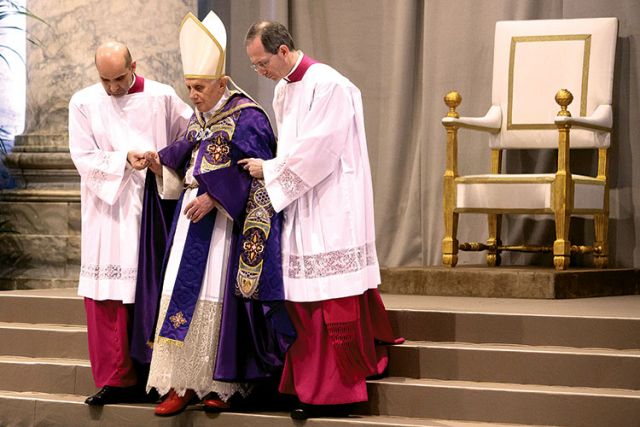Pope Benedict submitted his resignation freely, in accordance with the Church’s Code of Canon Law. He resigned Feb. 28, 2013 after eight years leading the world’s billion-plus Catholics. It was an unprecedented decision in modern history and offers the Church and the world a profound teaching moment. It is perfectly in line with one of the greatest teachers of the faith that the Church has ever known. By his bold and courageous decision, Benedict told us that we must be painfully honest with the human condition, that we cannot be enchained by history. A man who had been the champion of tradition and labelled “conservative” left us with one of the most progressive gestures made by any pope. This man known for brilliant writing, exquisite kindness, charity, gentleness, humility and clarity of teaching offered us the epitome of a courageous and humble decision that will forever mark the papacy and the life of the Church.
Benedict’s resignation provides a rare but profound example of humility in action. True leaders put their cause before their power and self-interest. Far from a failure or weakness, his resignation was the most shining moment of Benedict’s papacy and what will turn out to be a historically brilliant move. He has set a new course for the Church.
Benedict was pigeonholed from the beginning as the “conservative” pope. For eight years on the chair of Peter, Pope Benedict turned to Scripture far more than doctrine, making connections between the early Christians and people of our time struggling to live their faith. He tackled contemporary social and political issues by emphasizing a few main principles: that human rights rest on human dignity, that people come before profits, that the right to life is an ancient measure of humanity and not just a Catholic teaching, and that efforts to exclude God from civil affairs are corroding modern society. For Benedict, Christianity is an encounter with beauty, the possibility of a more authentic, more exciting life. His mantra was about friendship with Jesus and with God.
Benedict set the stage for the age of the New Evangelization by focusing in on three basics. His first three encyclicals examined the three cardinal virtues: faith, hope and love. His first three books focused on the centre of the Catholic faith: Jesus Christ. This great teaching pope lectured every Wednesday on issues like the catechesis, the Fathers of the Church, the saints, the Doctors of the Church, the psalms and prayer. In October 2013, he held a synod on the New Evangelization and in his opening speech declared “The Church exists to evangelize!”
Pope Benedict brilliantly emphasized the need for intense theological life, constant prayer and quiet contemplation which would naturally give way to good moral living, a commitment to others and a life of charity and justice.
As I look back over nearly eight years of his Petrine ministry, I am grateful for the special moments I spent in his presence.
When I was with him in Cologne for his first World Youth Day in August 2005, he exclaimed to the throngs of young Christians and the curious mixed in: “The Church can be criticized, because it contains both grain and weeds, but it is actually consoling to realize that there are weeds in the Church. In this way, despite all our defects, we can still hope to be counted among the disciples of Jesus, who came to call sinners.”
If any pope dealt with the weeds among the wheat during his pontificate, it was Benedict. He called sin and evil by their right names, and invited people to become friends with Jesus Christ. He faced head-on scandals and was unafraid to speak about them; he admitted errors made under his watch; he reached out to schismatics and experienced rejection of his efforts for unity; he extended peace branches to the great religions of the world unafraid to name the things that divide us and also the great hopes that unite us. He walked among kings and princes but never lost the common touch.
Aware of the “filth” in the Church in so many areas, it was then-Cardinal Ratzinger who pushed for new rules to weed out abuser priests and who wrote those rules into law as pope. Benedict, too, was the first pope to meet with victims of sex abuse, the first pope to apologize for the crisis in his own name and the first pope to dedicate an entire document to the abuse crisis in his 2010 letter to the Catholics of Ireland.
It was Benedict who established the new financial watchdog agency, who opened the Vatican for the first time to outside secular inspection through the Moneyval process (the Council of Europe’s anti-money-laundering agency) and who began to tackle the problems of the financial mismanagement and lack of transparency at the Vatican.
During these days of retrospection and commemoration of the first anniversary of Benedict’s resignation, many feel that in order to highlight the positive aspects of the “Franciscan” era, we must describe in negative terms the pontificate of Pope Benedict. That is not only absurd, but it is also indicates blindness, deafness and ignorance to what this great man accomplished. Let us not forget that many of the reforms now underway under Pope Francis’ leadership actually began on Benedict’s watch, especially in two chronic sources of scandal for the Church: money and sex abuse.
I am convinced that if today we are basking in Pope Francis’ light, we must be forever grateful to Benedict who has made Francis possible for the Church and the world. We owe Benedict immense gratitude.
(Rosica is CEO of the Salt and Light Catholic Media Foundation and Television and President of Assumption University in Windsor, Ont. He also serves as English language assistant to the Holy See Press Office and is a Consultor to the Pontifical Council for Social Communications.)


